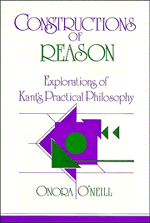Book contents
- Frontmatter
- Contents
- Preface
- List of abbreviations
- Part I Reason and critique
- 1 Reason and politics in the Kantian enterprise
- 2 The public use of reason
- 3 Reason and autonomy in Grundlegung III
- 4 Action, anthropology and autonomy
- Part II Maxims and obligations
- Part III Kant's ethics and Kantian ethics
- References
- Index
4 - Action, anthropology and autonomy
Published online by Cambridge University Press: 05 June 2012
- Frontmatter
- Contents
- Preface
- List of abbreviations
- Part I Reason and critique
- 1 Reason and politics in the Kantian enterprise
- 2 The public use of reason
- 3 Reason and autonomy in Grundlegung III
- 4 Action, anthropology and autonomy
- Part II Maxims and obligations
- Part III Kant's ethics and Kantian ethics
- References
- Index
Summary
What accounts for the gap between Kant's practical philosophy and contemporary would-be Kantian writing on ethics? No doubt it is partly that modern protagonists of “Kantian” ethics are mainly, some of them exclusively, interested in rights, which for Kant are one element in a broader picture. Perhaps the gap also reflects reluctance to take on the full sweep of Kant's thought, and the hope that this can be avoided by detaching the parts that appeal. However, the main source of divergence lies, I believe, in reliance upon radically differing conceptions of action and autonomy. Both Kant and his would-be followers admire freedom, rationality and autonomy; but their understandings of these terms are hugely different.
Much contemporary work in ethics and political philosophy, including “Kantian” writing, relies on a family of broadly empiricist theories of action in which reasons and desires, or preferences, are the key elements. Theories of action of this type are designed to meet two needs. On the one hand they are meant to explain acts as the product of certain desires and beliefs. On the other hand they are meant to provide models of rational choice that can guide action in the efficient pursuit of (intrinsically arbitrary) desires or preferences. An instrumental conception of practical reasoning is seen as a corollary of the causal explanations to which theoretical reasoning aspires. A unified theory of action can serve both purposes. On such an account agents are those who rationally pursue their desires or preferences; autonomous agents are those who do so with a relatively high degree of self-control or independence.
- Type
- Chapter
- Information
- Constructions of ReasonExplorations of Kant's Practical Philosophy, pp. 66 - 78Publisher: Cambridge University PressPrint publication year: 1990



